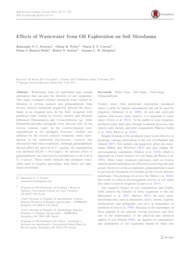Effects of wastewater from oil exploration on soil mesofauna.
Effects of wastewater from oil exploration on soil mesofauna.
Autoria: WEBER, O. B.; CORREIA, M. E. F.; MESQUITA, A. L. M.
Resumo: Wastewater from oil exploration may contain substances that can alter the diversity of soil organisms. This study evaluated whether produced water treated by filtration or reverse osmosis and glutaraldehyde from reverse osmosis treatments negatively affected the mesofauna in an irrigated area. In the field, irrigation with produced water treated by reverse osmosis and filtration influenced Hymenoptera and Cosmochthonius sp., while Entomobryomorpha springtails were affected only by the reverse osmosis water. In the ecotoxicological tests, reproduction in the springtail Folsomia candida was inhibited by the reverse osmosis treatment, while reproduction in the earthworm Enchytraeus crypticus was affected by both water treatments. Although glutaraldehyde did not affect the survival of F. candida, the reproduction was inhibited (EC50 = 44.4 mg/L). No adverse effect of glutaraldehyde was observed on reproduction or survival of E. crypticus. These results indicate that produced water, when used in irrigated agriculture, may affect soil functional mesofauna.
Ano de publicação: 2015
Tipo de publicação: Artigo de periódico
Unidade: Embrapa Agroindústria Tropical
Palavras-chave: glutaraldehyde, soil fauna, toxicology, water reuse
Observações
1 - Por padrão são exibidas publicações dos últimos 20 anos. Para encontrar publicações mais antigas, configure o filtro ano de publicação, colocando o ano a partir do qual você deseja encontrar publicações. O filtro está na coluna da esquerda na busca acima.
2 - Para ler algumas publicações da Embrapa (apenas as que estão em formato ePub), é necessário ter, no celular ou computador, um desses softwares gratuitos. Sistemas Android: Google Play Livros; IOS: iBooks; Windows e Linux: software Calibre.
Acesse outras publicações
Acesse a Base de Dados da Pesquisa Agropecuária (BDPA) para consultar o acervo completo das bibliotecas da Embrapa.

